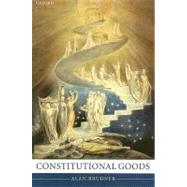Constitutional Goods
, by Brudner, Alan- ISBN: 9780199225798 | 0199225796
- Cover: Paperback
- Copyright: 5/24/2007
This book aims to distil the essentials of liberal constitutionalism from the jurisprudence and practice of contemporary liberal-democratic states. Most constitutional theorists have despaired of a liberal consensus on the fundamental goals of constitutional order. Instead they have contentedthemselves either with agreement on lower-level principles on which those who disagree on fundamentals may coincidentally converge, or, alternatively with a process for translating fundamental disgreement into acceptable laws.Alan Brudner suggests a conception of fundamental justice that liberals of competing philosophic schools may accept as fulfilling their own basic commitments. He argues that the model liberal-democratic constitution is best understood as a unity of three constitutional frameworks: libertarian,egalitarian, and communitarian. Each of these has a particular conception of public reason. Brudner criticizes each of these frameworks insofar as its organizing conception claims to be fundamental, and moves forward to suggest an Hegelian conception of public reason within which each framework iscontained as a constituent element of a whole.When viewed in this light, the liberal constitution embodies a surprising synthesis. It reconciles a commitment to individual liberty and freedom of conscience with the perfectionist idea that the state ought to cultivate a type of personality whose fundamental ends are the goods essential todignity. Such a reconciliation, the author suggests, may attract competing liberalisms to a consensus on an inclusive conception of public reason under which political authority is validated for those who share a confidence in the individual's inviolable worth.







